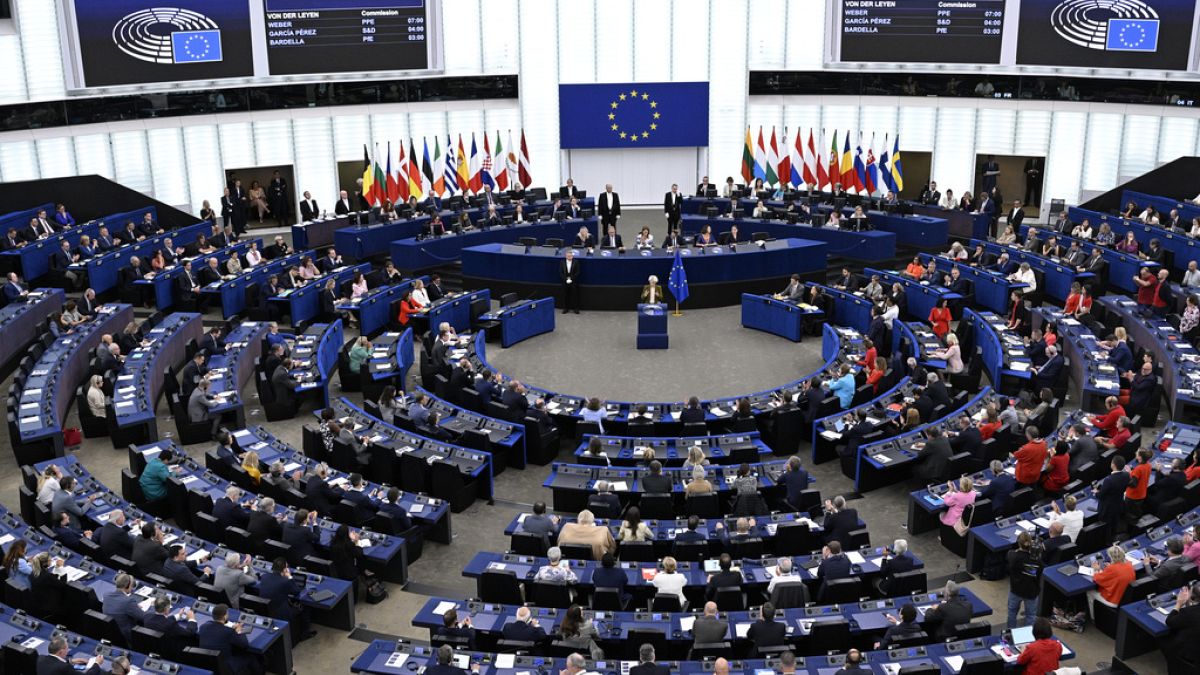A meeting between European lawmakers and MPs from the Russian State Duma on Wednesday sparked condemnation among other MEPs, who said it violated the European Parliament’s rules and demanded swift disciplinary measures.
Pina Picierno, the Italian socialist MEP and European Parliament vice president, told Euronews that, according to the rules, all members must act solely in the general interest of the EU and should not bring the European Parliament into disrepute through their conduct.
“It is therefore unacceptable that individual members, without any political or institutional mandate, engage in direct relations with the Russian Duma, the legislative body of an aggressor state subject to European and international sanctions,” Picierno said.
“Such initiatives not only violate the spirit of our rules of procedure but also risk being exploited by Kremlin propaganda to divide and weaken the European Union,” she explained.
Green Party MEP from Germany, Sergey Lagodinsky, said MEPs should not engage with sanctioned politicians.
“I will be clear: the Russian State Duma is directly complicit in the aggression against Ukraine, in the repression of Russian citizens, and in the dismantling of democratic freedoms. Its members include sanctioned individuals and known propagandists of Kremlin policies,” Lagodinsky said.
He recalled that the European Parliament has repeatedly and unequivocally condemned Russia’s war of aggression and stands in solidarity with Ukraine.
“As vice-president of Greens/EFA on Foreign Affairs, I strongly distance myself from this ‘event ‘. Any attempt to normalise “parliamentary contacts” with the State Duma is an attempt to normalize war of aggression,” Lagodinsky said.
Kartheiser defends his call
The video call between MEPs and Russian deputies took place on Wednesday and was led by Fernand Kartheiser, an MEP from Luxembourg.
Kartheiser, who is not affiliated with any groups in the European Parliament, stated in a press release that the meeting aimed to step up dialogue between Europe and Russia, particularly regarding Ukraine and sanctions.
Kartheiser said that although the meeting lacked a formal institutional character, it was a clear sign that MEPs want to re-establish a dialogue with Moscow.
“This is a symbolic meeting for us. We must not deviate from dialogue. On the contrary, we should discuss together the issues of Ukrainian settlement, the ways to establish lasting peace, to restore cooperation, and to counter the arms race,” Kartheiser said.
Earlier this year, Kartheiser was expelled from the parliamentary group of European Conservatives and Reformists (ECR) for visiting Moscow and having meetings with officials there.
From the Russian Duma side, the delegation was led by Leonid Slutsky, chairman of the committee on international affairs, who thanked the European participants for the dialogue, according to media reports.
Kartheiser refused Euronews’ request to disclose the list of participating MEPs, stating that this could damage their careers or activities within the European Parliament.
Euronews has reached out to political groups for information on whether their MEPs were part of the call.
However, the organiser of the talks, Kartheiser, insists on continuing to speak with the Russian lawmakers.
In his response sent to Euronews, he stated that after the video conference, several more MEPs contacted him to express their interest in the next meeting with Russian lawmakers.
Most Russian deputies under sanctions
The European Parliament cut ties with the Russian Duma in 2014, after the annexation of Crimea.
Therefore, members who engage with Russian diplomatic or governmental entities are acting in their sole personal capacity, the press service of the Parliament told Euronews.
In line with the renewed rules, MEPs have to declare meetings with any representatives of the countries concerned, even if subject to sanctions, the spokesperson warned.
Right now, 351 members of the State Duma who voted in favour of recognising the unilateral independence of non-government-controlled areas of the Donetsk and Luhansk regions of Ukraine — a move Brussels urged Russia to reverse — are under EU sanctions.
Diplomatic and government staff from Russia and Belarus have been banned from entering the European Parliament since March 2022, right after Moscow’s full-scale invasion of Ukraine in late February of the same year. This also applies to all Russian Duma deputies who are subject to EU sanctions.
Slutsky, who headed the Russian delegation for the Wednesday talks, is likewise on the EU sanctions list.
Read the full article here


